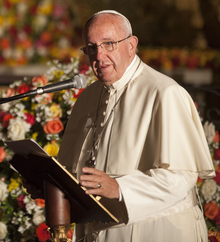
Back لاهوت البابا فرانسيس Arabic Teologia del Papa Francesc Catalan Teologie papeže Františka Czech Teologi Paus Fransiskus ID

Elected on 13 March 2013, Francis is the first member of the Society of Jesus to be appointed pope and the first non-European to hold the office since the 8th century.[1] He described his papal name as pointing to what he wants to emulate in Saint Francis of Assisi: to have a poor church, for the poor, always going out to the margins, and to show concern for the natural environment. His papal motto Miserando atque eligendo ("by having mercy and by choosing") contains a central theme of his papacy, God's mercy,[2][3] which has led to conflict with orthodox Catholics on issues such as reception of Communion by remarried Catholics. In addressing real life situations he often appeals directly to his experience, in continuity with his synodal way, which showed a renewed emphasis on listening and dialogue. He has placed greater emphasis on church synods and on widespread consultation and dialogue, uplifting the roles of laypersons and of women in the Catholic church and criticizing clericalism.
Francis' concern for the poor is noted in his critiques of capitalism, his quite visible support of refugees and migrants, and his outreach to liberationist, anarchist, communist, socialist and liberal movements in Latin America[citation needed] that were under a cloud during the papacy of John Paul II.[4] Francis has stated that he considers himself to be conservative.[a]
His apostolic exhortation Evangelii gaudium (Joy of the Gospel), released eight months after his election, has been described as programmatic, and "a core document of this pontificate",[6] in his own words "pointing out new paths for the Church's journey for years to come".[7] He has become known also for his "sharp and unscripted remarks".[8]
- ^ Rogers, Simon (13 February 2013). "Every Pope ever: the full list". The Guardian. Retrieved 24 September 2019.
- ^ "Pope Francis explains name, calls for church 'for the poor' - CNN". 17 March 2013. Archived from the original on 17 March 2013. Retrieved 24 September 2019.
- ^ "The Coat of Arms of Pope Francis". The Holy See. Retrieved 1 October 2019.
- ^ "Latin American Catholics' problem with Pope John Paul II". The Seattle Times. 11 April 2005. Retrieved 12 September 2020.
- ^ "En primicia el Papa en Televisa: "El mundo sin la mujer no funciona"". Vaticannews.va/es (in Spanish). 28 May 2019.
- ^ "Francis: This is how the joy of the Gospel can reform the Church". La Stampa. 26 November 2013. Retrieved 7 June 2017.
- ^ Pope Francis (24 November 2013). "Evangelii Gaudium: Apostolic Exhortation on the Proclamation of the Gospel in Today's World". Vatican. Opening paragraph. Retrieved 7 June 2017.
- ^ "The pope said what? Six stunners from Francis". Retrieved 4 April 2018.
Cite error: There are <ref group=lower-alpha> tags or {{efn}} templates on this page, but the references will not show without a {{reflist|group=lower-alpha}} template or {{notelist}} template (see the help page).
© MMXXIII Rich X Search. We shall prevail. All rights reserved. Rich X Search